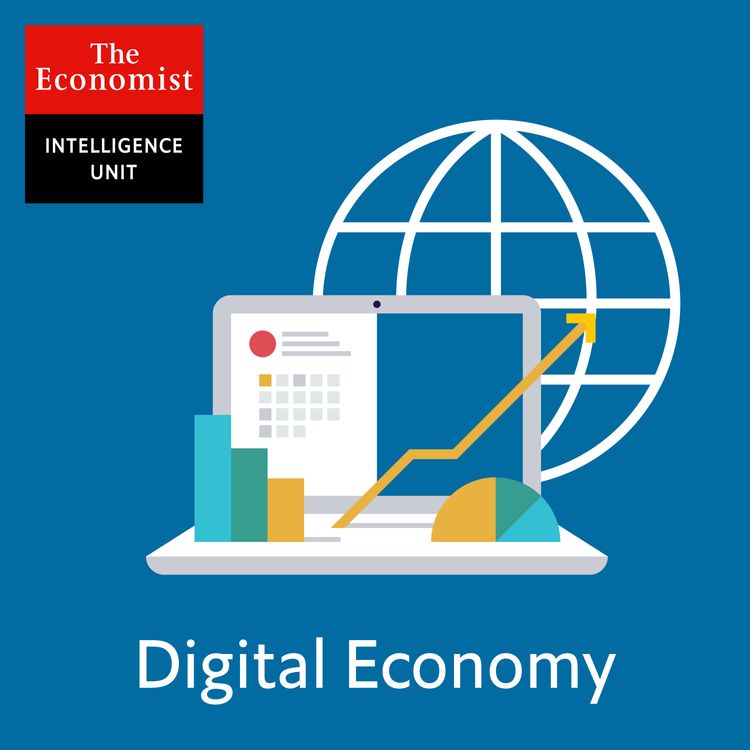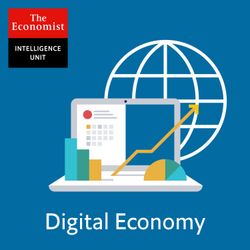Share

The Economist Intelligence Unit: Digital Economy
Digital Economy: The digitisation of healthcare
Season 2, Ep. 11
•
There can be few applications of digital technology more worthwhile than saving lives, but integrating digital technology into healthcare systems is uniquely complex. This episode provides an introduction to some of the challenges that healthcare providers face in their pursuit of digital innovation, and explores some of the paths forward. Host Pete Swabey is joined by Professor Ann Blandford, deputy director for digital health at the UCL Institute of Healthcare Engineering; by Jackie Hunter, chief executive, clinical programmes & strategic relationships at AI-powered drug development firm Benevolent.AI; and by Elizabeth Sukkar, managing editor and global editorial lead for healthcare at The EIU. Sponsored by DXC Technology.
More episodes
View all episodes

14. Digital Economy: Digital manufacturing
30:28||Season 3, Ep. 14This episode examines the potential, the challenges and the future of two dimensions of digital manufacturing. Firstly, the integration of digital functionality in manufacturing processes to monitor, manage and predict performance and link together participants on the value chain. And secondly, additive manufacturing or 3D printing, which is by necessity a blend of physical and digital systems. Host Pete Swabey is joined by Dr Low Hong Yee, director of the Digital Manufacturing and Design Centre at Singapore University of Technology and Design, and Klaus Mueller, chief operating officer for Asia at bearings manufacturer Schaeffler. Sponsored by DXC Technology.
13. Digital Economy: The future of payments
31:55||Season 3, Ep. 13The payments ecosystem has witnessed a blossoming of digital innovation in recent times, from the back-end infrastructure to the point of sale. Now, ‘big tech’ is entering the fray. This episode examines the potential impact of the digitisation of payments, with reference to the UK, where many payments innovations have been adopted sooner than most. Host Pete Swabey is joined by Adrian Buckle, head of research for trade association UK Finance; Steve Everett, managing director of payments for global transaction banking at Lloyds Banking Group; and Fiona Roach Canning, co-founder of UK-based fintech Pollinate. Sponsored by DXC Technology.
12. Digital Economy: Digital skills
29:53||Season 2, Ep. 12As cloud computing, network connectivity, and commodity hardware have reduced barriers to the technical infrastructure of the digital economy, talent and skills have emerged as the most sought after fuel for innovation. But work such as software development or data science can in theory be delivered from anywhere, geography still seems to influence the market for digital skills, with hubs such as Silicon Valley acting as beacons for talent. On this month’s episode, we discuss the dynamics of digital skills, exploring how digitisation itself is shaping their supply and demand. Host Pete Swabey is joined by Joysy John, director of education at UK innovation foundation Nesta, and Chris Johnson, CEO and co-founder of talent acquisition platform Uncubed. Sponsored by DXC Technology.
10. Digital Economy: Global digital culture
31:15||Season 2, Ep. 10Nothing spreads faster and further on the internet than ideas. This month’s episode examines the global spread of culture, and in particular youth culture, and its implications for international businesses and society at large. Host Pete Swabey is joined by Kathy Sheehan, SVP and trends maven at marketing research company Cassandra, Ravi Govada, head of global market research at hospitality start-up Selina, and Peter Chonka, lecturer in global digital cultures at King’s College London. Sponsored by DXC Technology.
9. Digital Economy: The digitisation of trade
29:14||Season 2, Ep. 9This month, we examine the impact of digitisation on trade. We explore how digital technology is affecting the way goods are shipped around the world, the impact of e-commerce on global trade, and the role of digitisation in the growth of trade in services. Host Pete Swabey is joined by Martin Holme, global head of supply chain management and e-commerce logistics at shipping giant Maersk, Jenna Brown, CEO and co-founder of supply chain data management start-up Shipamax, and by Christopher Clague, managing editor and global editorial lead for trade and globalisation at The EIU. Sponsored by DXC Technology.
8. Digital Economy: Thingonomics
28:22||Season 2, Ep. 8In this episode, we investigate the microeconomics of the internet of things (IoT) to discover how businesses large and small can make connected products work commercially. Host Pete Swabey is joined from Hong Kong by Serena Pau, head of product development at energy provider CLP’s innovation hub; by Anvil Ng, senior manager for acceleration programmes at Hong Kong Science and Technology Parks; and by Florian Simmendinger, founder and CEO of music tech start-up SoundBrenner.
2. Digital Economy: The audible internet
30:30||Season 2, Ep. 2This episode of The EIU Digital Economy podcast explores how the growing prevalence of smart speakers and other audio technologies will change the internet and organisations that use it to reach their audiences. Host Pete Swabey is joined in London by Jennifer Allum, head of gov.uk, the UK government’s public information site; by Ben Sauer, director of conversational design at digital health start-up Babylon Health, and by Dr Lorenzo Picinali, senior lecturer in audio interface design at Imperial College London. Sponsored by DXC Technology
1. Digital Economy: Digital democracy
32:08||Season 2, Ep. 1This episode of The EIU Digital Economy podcast explores the impact of digital technology on democracy. Host Pete Swabey is joined from New York by Professor Beth Simone Noveck, founder and director of the Governance Lab at New York University’s Tandon School of Engineering, and Seth Flaxman and Kathryn Peters, co-founders of Democracy Works, a non-profit organisation that builds digital tools that support democracy. Sponsored by DXC Technology